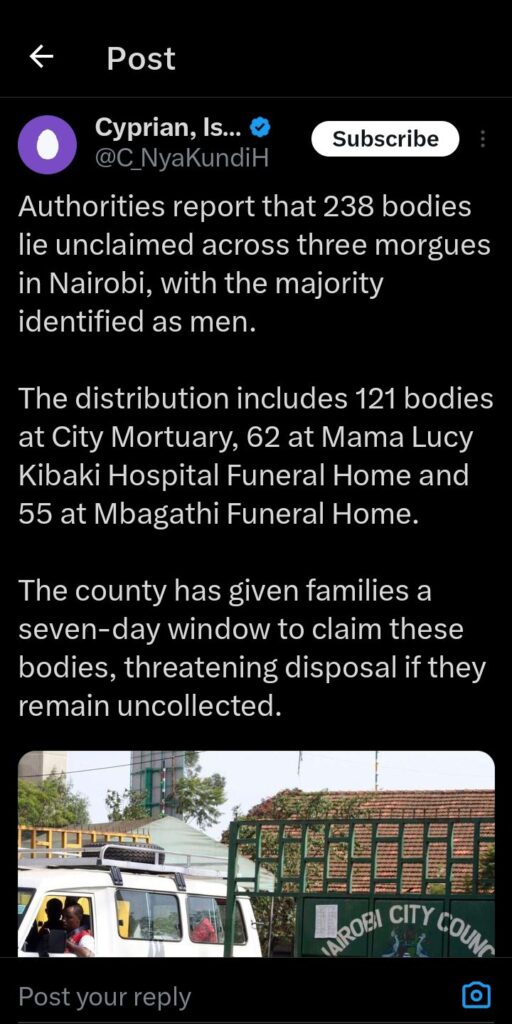Nairobi is facing yet another crisis under Governor Johnson Sakaja’s leadership, with 238 unclaimed bodies currently lying in three mortuaries across the city. The county has given families only seven days to identify and collect their deceased relatives, warning that the bodies will be disposed of if left unclaimed.
The distribution of these bodies is alarming: 121 at City Mortuary, 62 at Mama Lucy Kibaki Hospital Funeral Home, and 55 at Mbagathi Funeral Home. Most of the bodies belong to men, raising serious concerns about the circumstances under which they died.

Blogger Cyprian Nyakundi has shared the shocking news on X (formerly Twitter), highlighting the disturbing trend of rising deaths in Nairobi and questioning Sakaja’s leadership. The presence of so many unclaimed bodies suggests a deeper issue, one that goes beyond negligence.
Reports indicate that some of these bodies belong to individuals who met violent deaths, including victims of police brutality and extrajudicial killings.

Under Sakaja’s watch, Nairobi has seen a surge in cases of missing persons, many of whom later turn up dead in morgues or, worse, dumped in forests and rivers. There have been claims that rogue police officers, allegedly working with the county government, are behind some of these deaths. Several human rights groups have accused the Nairobi County administration of failing to address the growing number of enforced disappearances.
Families searching for missing loved ones have often been turned away from police stations, only to later discover their bodies in morgues. With the current situation, it is evident that the problem is not just about unclaimed bodies but a larger issue of lawlessness, cover-ups, and possible collusion between the county government and criminal elements within the police force.
Sakaja’s administration has done little to address the rising insecurity in Nairobi. Instead, his government is focusing on issuing threats of mass disposal of bodies rather than investigating why so many people are ending up dead.

This is not the first time such an issue has come up. Last year, over 100 bodies were discovered in Nairobi mortuaries under similar circumstances, yet nothing was done to ensure it does not happen again. This pattern raises questions about whether the governor is ignoring the crisis or is actively benefiting from it in one way or another.
The lack of accountability in Sakaja’s administration is evident. While other counties have mechanisms in place to track and identify unclaimed bodies, Nairobi’s government seems uninterested in ensuring that families have enough time and resources to find their missing loved ones.
Instead, the county is quick to announce disposal notices, further adding to the pain of affected families. By doing so, Sakaja is not only failing the people of Nairobi but also allowing a system that enables rogue elements to continue operating with impunity.

The silence from the governor on the allegations of collusion with rogue officers is also telling. If he truly cared about the people of Nairobi, he would have addressed these claims and ordered investigations into why so many people are dying under suspicious circumstances.
His inaction only fuels speculation that he is either complicit or completely incapable of managing the county. Either way, Nairobi is suffering under his leadership, and this latest crisis is proof of his incompetence.





















Add Comment